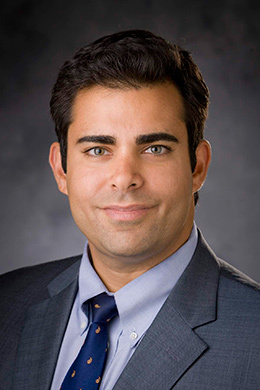 Kamrouz Ghadimi, MD, MHSc, FAHA
Kamrouz Ghadimi, MD, MHSc, FAHA
Associate Professor of Anesthesiology & Critical Care
Director, Clinical Research Unit
Department of Anesthesiology
Duke University Health System
Durham, NC
Dr. Ghadimi’s Research
Right Ventricular Metabolic Dysregulation after Surgery for Heart Failure
Perioperative right heart failure (RHF) is the leading cause of death within thirty days of left ventricular assist device and heart transplant operations. To protect against early RHF development, cardiac anesthesiologists initiate inhaled pulmonary vasodilators (iPVD) to lower right ventricular (RV) afterload, which augments stroke volume by “coupling” RV contractility with pulmonary arterial (PA) vasodilation. Sadly, there is marked heterogeneity in the response to iPVD and nearly 50% of patients display persistently elevated RV afterload. Metabolically, elevated afterload can lead to dysregulated fatty acid oxidation in RV myocytes, normally reliant on mitochondrial transport of long-chain acylcarnitines for high-throughput ATP synthesis. This metabolic defect results in ceramide-induced lipotoxic apoptosis and acylcarnitine leakage into circulation. Leveraging the biorepository from a parent trial at our institution that is evaluating iPVD use to treat RV afterload following LVAD and heart transplant operations (NCT03081052), the overall objective in this application is to identify cardiometabolic pathways that underlie early RHF after these operations due to changes in RV afterload and heterogeneity in response to iPVD. Supported by preliminary metabolomic analyses, the central hypothesis posits that RV-PA coupling is optimized in the responder phenotype, which signals efficient fatty acid oxidation in RV myocardium. Aim 1 will quantify differences in key metabolites using targeted mass spectrometry in serial plasma and RV myocardial samples to determine cardiometabolic pathways, including dysregulated fatty acid oxidation, that underlie early RHF and heterogeneity in response to iPVD. Aim 2 will identify baseline biomarkers reflecting fatty acid oxidation defects that are associated with RV-PA coupling status, iPVD response phenotypes, and early RHF development to create an integrated clinical-molecular model for outcome prediction in critically-ill patients.
Related Publications
Inhaled Epoprostenol Compared With Nitric Oxide for Right Ventricular Support After Major Cardiac Surgery
K. Ghadimi et al.
Right ventricular failure (RVF) is a leading driver of morbidity and mortality after major cardiac surgery for advanced heart failure, including orthotopic heart transplantation and left ventricular assist device implantation. Inhaled pulmonary-selective vasodilators, such as inhaled epoprostenol (iEPO) and nitric oxide (iNO), are essential therapeutics for the prevention and medical management of postoperative RVF. However, there is limited evidence from clinical trials to guide agent selection despite the significant cost considerations of iNO therapy. In this double-blind trial of 231 randomized participants, the authors found that among patients undergoing major cardiac surgery for advanced heart failure, inhaled pulmonary-selective vasodilator treatment using iEPO was associated with similar risks for RVF development and development of other postoperative secondary outcomes compared with treatment using iNO.
Inhaled Pulmonary Vasodilator Therapy in Adult Lung Transplant: A Randomized Clinical Trial
K. Ghadimi et al.
Inhaled pulmonary vasodilators (iPVD) are commonly used in lung transplant recipients to mitigate the risk of primary graft dysfunction (PGD). While inhaled nitric oxide (iNO) is the gold standard for iPVD therapy, inhaled epoprostenol (Veletri®) has been introduced as a cost-conscious iNO-alternative without high-grade evidence. This clinical trial was conducted to primarily determine if inhaled epoprostenol is equivalent to iNO in the ability to modify grade 3 PGD after orthotopic lung transplantation.
Podcast: JAMA Network – JAMA Surgery Author Interviews
Inhaled Selective Pulmonary Vasodilators for Advanced Heart Failure Therapies
K. Ghadimi et al.
Inhaled pulmonary vasodilators (iPVD) are commonly used to lower PVR to modify the risk of acute RV failure in durable LVAD implantation or orthotopic heart transplantation (OHT). While inhaled nitric oxide (iNO) is the iPVD gold standard, inhaled epoprostenol (Veletri®) has been introduced as a cost-conscious alternative without high-grade evidence. This research investigates whether inhaled epoprostenol is equivalent to iNO in the ability to modify acute RVF after advanced heart failure therapies.
International Anesthesia Research Society
